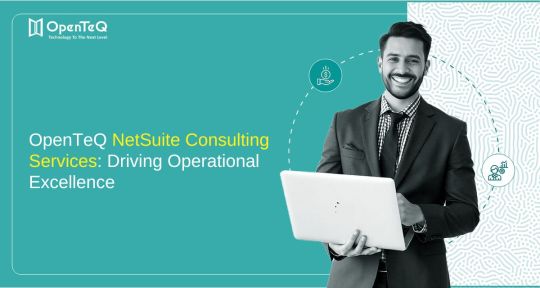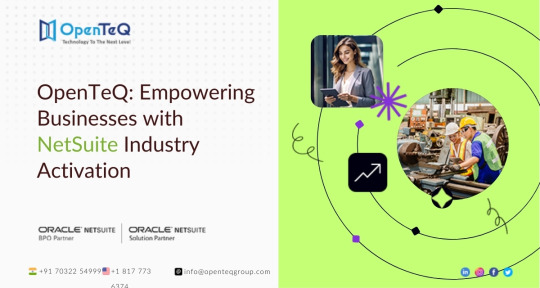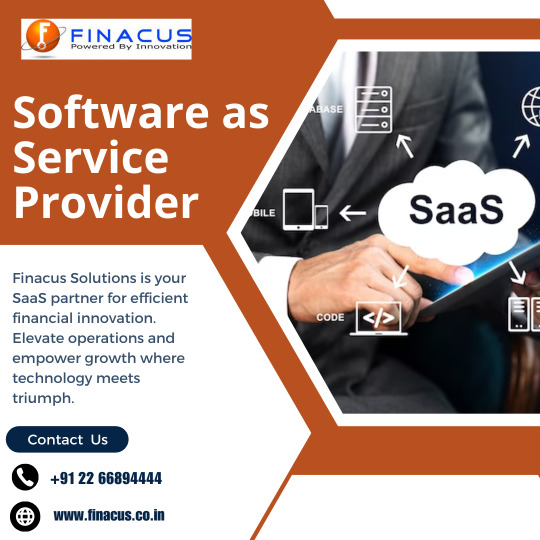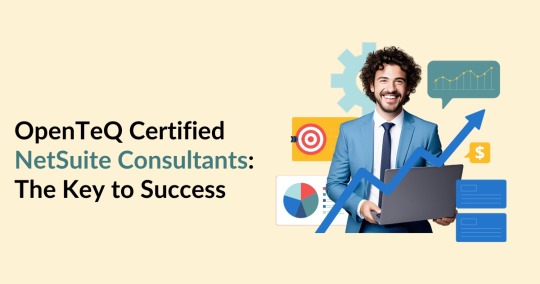#financial software solution provider
Link
Digital finance management is becoming trending now and hence, you can opt for financial software that helps to reduce manual error and control expenses.
#financial software development company#financial software development#financial software solution provider
0 notes
Text
OpenTeQ NetSuite Consulting Services: Driving Operational Excellence

NetSuite Consulting Services offer businesses the expertise needed to maximize the benefits of their NetSuite ERP platform. From implementation to customization and optimization, these services help organizations streamline their operations and ensure seamless integration of the platform into existing workflows. NetSuite consultants work closely with businesses to assess their unique requirements and tailor solutions that address specific challenges. Their role extends beyond the initial setup, providing ongoing support and system optimization to adapt to changing business needs and growth objectives.
NetSuite Solutions Provider: Your Strategic Partner for Success
A NetSuite Solutions Provider is a certified partner with the expertise and authority to sell, implement, and manage NetSuite solutions for businesses. These providers act as strategic partners, guiding organizations through every stage of the NetSuite journey, from selecting the right package to ensuring successful deployment. The advantage of working with a NetSuite Solutions Provider lies in their deep knowledge of industry-specific challenges and best practices. They can customize NetSuite's capabilities to match the unique workflows of different sectors, providing businesses with the tools they need to enhance productivity, scalability, and profitability.
NetSuite Services: Comprehensive Support for Your ERP Needs
NetSuite Services cover a wide range of support functions designed to help businesses get the most out of their ERP platform. These services include system implementation, integration with other business applications, data migration, and end-user training. Whether a company is new to NetSuite or looking to upgrade its current system, these NetSuite services ensure a smooth transition with minimal disruptions. Additionally, ongoing support and maintenance are crucial for ensuring that the system continues to meet business objectives and operates efficiently, even as the company grows or changes.
NetSuite Accounting Services: Ensuring Compliance and Accuracy
NetSuite Accounting Services provide organizations with expert accounting support through the platform’s advanced financial management tools. These services help businesses automate key accounting processes such as reconciliation, tax calculation, and audit preparation, ensuring accuracy and regulatory compliance. With NetSuite’s built-in accounting functionalities, organizations can manage multiple subsidiaries, currencies, and tax jurisdictions with ease. By leveraging NetSuite’s capabilities, businesses can reduce financial risks, improve reporting accuracy, and ensure that their accounting practices are aligned with both local and international standards.
Conclusion
OpenTeQ Technologies offers comprehensive NetSuite Consulting Services designed to help businesses fully leverage the power of the NetSuite platform. As a trusted NetSuite Solutions Provider, OpenTeQ delivers tailored NetSuite Services that include expert guidance on system implementation, optimization, and ongoing support.
With a strong focus on NetSuite Development, they provide customized solutions that adapt the platform to meet specific business needs, enhancing operational efficiency. Their expertise in NetSuite Financial Software and NetSuite Accounting Services ensures that businesses can streamline financial processes, maintain compliance, and improve overall financial transparency. By partnering with OpenTeQ Technologies, organizations can unlock the full potential of NetSuite to drive growth and operational excellence.
#IndustryActivation#NetSuite Industry Activation#NetSuite for Manufacturing#Manufacturing ERP & Management Software#NetSuite ERP Software for Manufacturing Companies#NetSuite for Manufacturers#NetSuite ERP for Manufacturers#Manufacturing with NetSuite#NetSuite Solutions for Manufacturing#NetSuite Portals for Manufacturing#NetSuite Services#NetSuite Services Company#Top NetSuite Services Provider#NetSuite Support Services#NetSuite Solutions Provider#NetSuite Development Company#NetSuite Development#NetSuite Developer#NetSuite Consultation#NetSuite Consulting Services#NetSuite Accounting Services#NetSuite Financial Software#NetSuite BPO Accounting Services
0 notes
Text
OpenTeQ: Empowering Businesses with NetSuite Industry Activation

In today’s fast-paced business world, the ability to quickly adapt and leverage cutting-edge technologies can be the difference between stagnation and success. OpenTeQ’s NetSuite Industry Activation helps businesses across diverse industries gain a competitive edge by harnessing the power of NetSuite ERP. Whether you are a startup or an established enterprise, OpenTeQ’s expertise ensures that your industry-specific needs are met with tailored solutions that drive growth, efficiency, and agility.
Why Industry Activation Matters
Industries today are facing unique challenges: evolving customer expectations, compliance regulations, supply chain issues, and rapid technological shifts. Industry activation is the process of implementing specialized solutions that are fine-tuned to the specific demands of a sector. OpenTeQ ensures that businesses activate their NetSuite ERP solutions with industry-specific functionalities, thus maximizing the platform’s potential while minimizing disruption during the transition.
Industry-Specific Solutions for Maximum Impact
OpenTeQ takes pride in offering tailored NetSuite industry solutions that cater to specific industries, including retail, manufacturing, healthcare, financial services, and more. Each industry operates with unique workflows, regulatory requirements, and market trends. With NetSuite’s versatile cloud-based ERP, combined with OpenTeQ’s deep expertise, businesses are empowered to:
Optimize operations: Achieve greater visibility across supply chains, inventory, and financials, allowing for more informed decision-making.
Improve customer experience: Leverage tools that enhance customer interactions and loyalty, especially for customer-driven industries like retail and hospitality.
Boost compliance and security: Implement regulatory-compliant solutions that meet industry standards, crucial in sectors like healthcare and finance.
For instance, manufacturers benefit from real-time inventory management, while service-based industries can streamline their billing and project management processes. OpenTeQ ensures that each activation is fully aligned with the client’s strategic goals and operational requirements.
The OpenTeQ Approach: Seamless Activation with Lasting Results
One of the key reasons businesses trust OpenTeQ for their NetSuite needs is the company’s holistic approach to activation. It’s not just about deploying software; it’s about enabling organizations to leverage the full potential of their ERP systems in a way that integrates seamlessly with their existing processes.
Step-by-Step Activation Process:
Assessment and Consultation: OpenTeQ starts by thoroughly understanding the business’s challenges and objectives, customizing solutions that meet those specific needs.
Planning and Implementation: The team designs an activation roadmap, ensuring smooth integration with minimal disruption. Every module is selected based on the industry’s demands.
Customization and Optimization: NetSuite’s flexible architecture allows for industry-specific customizations. OpenTeQ configures workflows, dashboards, and reports to suit each client’s unique operations.
Training and Support: A comprehensive training program ensures that the client’s teams can effectively use the system, while ongoing support guarantees continuous optimization and growth.
Continuous Innovation and Support
The business world is constantly changing, and industry-specific needs evolve over time. OpenTeQ ensures businesses remain at the forefront by offering continuous innovation through NetSuite updates and upgrades. With every activation, OpenTeQ clients gain access to a robust ecosystem of tools and insights that help them stay ahead of market trends and disruptions.
Whether through automating manual tasks, refining reporting systems, or enhancing customer relationship management (CRM) capabilities, the OpenTeQ-NetSuite partnership offers a dynamic and evolving solution. OpenTeQ’s ongoing support ensures that businesses not only adopt NetSuite successfully but also thrive as their industries continue to evolve.
Why Choose OpenTeQ?
OpenTeQ is a trusted NetSuite partner with years of experience helping businesses unlock the full potential of their ERP systems. The company’s industry activation services are designed to meet the specific needs of various sectors, ensuring that clients can focus on growth without getting bogged down by inefficiencies or outdated processes. With OpenTeQ’s guidance, businesses can optimize performance, enhance customer satisfaction, and remain compliant in an increasingly complex regulatory landscape.
Conclusion
For companies across industries, NetSuite Industry Activation by OpenTeQ offers the ultimate solution for navigating today’s competitive marketplace. By providing industry-specific solutions and ensuring seamless implementation, OpenTeQ enables businesses to streamline their operations, optimize their resources, and achieve lasting success. Whether your organization is in manufacturing, retail, healthcare, or another sector, OpenTeQ is ready to help activate your business’s full potential with NetSuite ERP.
#NetSuite Services#NetSuite Solutions Provider#NetSuite Implementation partner#NetSuite ERP Consulting#NetSuite ERP Implementation#NetSuite Consultation#NetSuite Support Services#NetSuite Integration Platform#NetSuite Implementation Consultant#NetSuite Technical Consultant#NetSuite Development#NetSuite Integration Consultants#NetSuite Developer#NetSuite Implementation Company#NetSuite Development Company#NetSuite ERP Support#NetSuite Project Implementation#NetSuite ERP Solution Provider#NetSuite Accounting Services#NetSuite Financial Software#NetSuite SP Partner#NetSuite Solution Provider Partner#NetSuite BPO Partner#NetSuite Customization#NetSuite Data Migration#NetSuite Consulting#Certified NetSuite Partner#NetSuite Accounting Partner#NetSuite CRM#NetSuite Customer Support & Customization
0 notes
Text
Simplifying Business Operations with NetSuite Services| OpenTeQ
Insurance companies are constantly seeking ways to streamline their operations and improve efficiency. One solution that has gained widespread popularity is NetSuite, a comprehensive cloud-based ERP solution that offers a range of services to help businesses manage their finances, operations, and customer relationships.
NetSuite Project Implementation:
NetSuite Project Implementation refers to the process of deploying and customizing NetSuite software to meet the specific needs of a business. This typically involves working with a NetSuite ERP Solution Provider who has the expertise and experience to ensure a smooth transition to the new system. During implementation, the provider will assess the company's requirements, configure the software, migrate data from existing systems, and provide training to users.
NetSuite ERP Solution Provider:
A NetSuite ERP Solution Provider is a company or individual that specializes in implementing and supporting NetSuite software. These providers have a deep understanding of the NetSuite platform and can help businesses optimize their use of the software to achieve their goals. Whether it's streamlining financial processes, improving inventory management, or enhancing customer service, an ERP Solution Provider can tailor NetSuite to meet the unique needs of each client.
NetSuite Accounting Software:
NetSuite Accounting Software is a core component of the NetSuite platform, allowing businesses to manage their financials with ease and accuracy. With features such as general ledger, accounts payable, accounts receivable, and financial reporting, NetSuite Accounting Software provides a comprehensive solution for tracking and analyzing financial data. By centralizing financial information in one system, businesses can improve visibility, reduce errors, and make more informed decisions.
NetSuite Financial Software:
NetSuite Financial Software goes beyond basic accounting functionality to provide advanced capabilities for financial management. This includes tools for budgeting and forecasting, revenue recognition, expense management, and financial consolidation. With NetSuite Financial Software, businesses can gain greater control over their finances, streamline processes, and drive growth.
NetSuite Solution Provider Partner:
A NetSuite Solution Provider Partner is a company that has been certified by NetSuite to sell and implement its software. These partners undergo rigorous training and testing to ensure they have the expertise to deliver quality service to their clients. By partnering with a certified provider, businesses can access the knowledge and support they need to maximize the value of their investment in NetSuite.
Benefits of NetSuite Services:
Streamlined Operations: NetSuite centralizes key business processes, enabling companies to streamline operations and eliminate inefficiencies.
Real-time Visibility: With NetSuite, businesses have real-time access to critical data, allowing them to make informed decisions and respond quickly to changing market conditions.
Scalability: NetSuite is highly scalable, making it suitable for businesses of all sizes and industries. Whether you're a small startup or a large enterprise, NetSuite can grow with your business.
Cost Savings: By consolidating multiple systems into one, NetSuite helps businesses reduce IT costs, improve productivity, and achieve a faster return on investment.
Enhanced Security: NetSuite employs robust security measures to protect sensitive data and ensure compliance with industry regulations.
Conclusion:
NetSuite services offer a powerful solution for businesses looking to streamline their operations, improve efficiency, and drive growth. Whether you're in need of project implementation, accounting software, financial management tools, or expert support, NetSuite and its certified partners can help you achieve your goals. With its cloud-based platform, scalability, and comprehensive features, NetSuite is the ideal choice for businesses seeking a flexible and cost-effective ERP solution.
#NetSuite Project Implementation#NetSuite ERP Solution Provider#NetSuite Accounting Software#NetSuite Financial Software#NetSuite Solution Provider Partner
0 notes
Text

#core banking solution providers#banking solutions#enterprise solutions services#digital payment solution#financial software companies#aeps software provider#banking as a service provider
0 notes
Text
#KYC UK#KYC in UK#KYC solutions provider in UK#KYC Provider in UK#KYC solutions provider#KYC providers#KYC API#KYC software#finance#banks#fintech#banking#financial
1 note
·
View note
Text
KYC Solution Platform in Canada
KYC plays a vital role in financial and non-financial businesses to verify the client's identity. KYC gives the complete surety of the business's true identity and helps create trust between two companies' relationships. KYC Canada is a trusted KYC solution platform that helps verify the client's identity via APIs and even speeds up the client onboarding process.

#kyc providers#kyc api#kyc solution#kyc verification#kyc platform#kyc software#KYC Solution Platform#KYC Canada#KYC Solution provider in Canada#Canada KYC#insurance#financial#banking#banks#cryptocurrency#fintech#gaming#healthcare
1 note
·
View note
Text
3 Questions to ask your ERP consultant pre-hire
ERP consultants are very pricey these days. Before you engage one for your ERP project, examine the following criteria to help you find the ideal one. These should be the ideal questions on whether you want to employ a consultant for selection, project management, or another ERP reason.
What ERP software is available?
With so many ERP options on the market, picking which one is best for your…

View On WordPress
#best erp software for manufacturing#best erp software for small business#best erp software in dubai#best erp software in uae#erp consulting companies#ERP Dubai#ERP for Manufacturing industry#ERP Software for Textile Companies#ERP Software for Trading Companies#erp software solutions#erp software solutions dubai#erp software uae#erp solution#erp solution dubai#erp solution providers#erp solution providers in uae#erp uae#Financial Management#Food Manufacturing ERP Solutions#retail erp software#retail erp software dubai#retail erp solutions#top 10 erp software#top erp companies#top erp software vendors
0 notes
Text
What is the reason why most financial software development companies use machine learning services when developing fintech apps? I believe this blog will be of interest to you. If you want to develop Fintech software that is focused on quality, we are a Custom fintech app development company here for you.
#fintech software development company#fintech software development#financial software development company#financial software development#custom fintech app development#fintech solutions company#Fintech Application Development in usa#fintech development company#fintech software development services#fintech software developers#custom fintech software development#machine learning consulting services#machine learning development company#machine learning consulting companies#deep learning development company#machine learning service provider#machine learning service providers#machine learning solutions development#machine learning solutions in usa#machine learning solution providers#machine learning solutions company#artificial intelligence consulting company#machine learning consulting company
0 notes
Text
CREVH - GOLD

QuickBooks is a renowned accounting software that offers a seamless solution for small businesses to manage their financial tasks efficiently. With features designed to streamline accounting processes, QuickBooks simplifies tasks such as tracking receipts, income, bank transactions, and more. This software is available in both online and desktop versions, catering to the diverse needs of businesses of all sizes. QuickBooks Online, for instance, allows users to easily track mileage, expenses, payroll, send invoices, and receive payments online, making it a comprehensive tool for financial management. Moreover, QuickBooks Desktop provides accountants with exclusive features to save time and enhance productivity. Whether it's managing income and expenses, staying tax-ready, invoicing, paying bills, managing inventory, or running reports, QuickBooks offers a range of functionalities to support businesses in their accounting needs.
Utilizing qb accounting software purposes comes with a myriad of benefits that can significantly enhance business operations. Some key advantages of using QuickBooks include:
- Efficient tracking of income and expenses
- Simplified tax preparation and compliance
- Streamlined invoicing and payment processes
- Effective management of inventory
- Generation of insightful financial reports
- Integration with payroll and HR functions
These benefits not only save time and effort but also contribute to better financial decision-making and overall business growth. QuickBooks is designed to meet the diverse needs of businesses, offering tailored solutions for various industries and sizes.
When considering accounting qb software options, QuickBooks stands out as a versatile and comprehensive choice. To provide a holistic view, let's compare QuickBooks with two other popular accounting software options - Xero and FreshBooks. quick book accounting package and offers robust features for small businesses, including advanced accounting capabilities, invoicing, payment processing, and payroll management. Xero, on the other hand, is known for its user-friendly interface and strong collaboration features, making it a popular choice among startups and small businesses. FreshBooks excels in invoicing and time tracking functionalities, catering to freelancers and service-based businesses. By evaluating the features, pricing, and user experience of these accounting software options, businesses can make an informed decision based on their specific needs and preferences.
555 notes
·
View notes
Text
It starts with him
What was once a promise of technology to allow us to automate and analyze the environments in our physical spaces is now a heap of broken ideas and broken products. Technology products have been deployed en masse, our personal data collected and sold without our consent, and then abandoned as soon as companies strip mined all the profit they thought they could wring out. And why not? They already have our money.
The Philips Hue, poster child of the smart home, used to work entirely on your local network. After all, do you really need to connect to the Internet to control the lights in your own house? Well you do now!Philips has announced it will require cloud accounts for all users—including users who had already purchased the hardware thinking they wouldn’t need an account (and the inevitable security breaches that come with it) to use their lights.
Will you really trust any promises from a company that unilaterally forces a change like this on you? Does the user actually benefit from any of this?
Matter in its current version … doesn’t really help resolve the key issue of the smart home, namely that most companies view smart homes as a way to sell more individual devices and generate recurring revenue.
It keeps happening. Stuff you bought isn’t yours because the company you bought it from can take away features and force you to do things you don’t want or need to do—ultimately because they want to make more money off of you. It’s frustrating, it’s exhausting, and it’s discouraging.
And it has stopped IoT for the rest of us in its tracks. Industrial IoT is doing great—data collection is the point for the customer. But the consumer electronics business model does not mesh with the expected lifespan of home products, and so enshittification began as soon as those first warranties ran out.
How can we reset the expectations we have of connected devices, so that they are again worthy of our trust and money? Before we can bring the promise back, we must deweaponize the technology.
Guidelines for the hardware producer
What we can do as engineers and business owners is make sure the stuff we’re building can’t be wielded as a lever against our own customers, and to show consumers how things could be. These are things we want consumers to expect and demand of manufacturers.
Control
Think local
Decouple
Open interfaces
Be a good citizen
1) Control over firmware updates.
You scream, “What about security updates!” But a company taking away a feature you use or requiring personal data for no reason is arguably a security flaw.
We were once outraged when intangible software products went from something that remained unchanging on your computer, to a cloud service, with all the ephemerality that term promises. Now they’re coming for our tangible possessions.
No one should be able to do this with hardware that you own. Breaking functionality is entirely what security updates are supposed to prevent! A better checklist for firmware updates:
Allow users to control when and what updates they want to apply.
Be thorough and clear as to what the update does and provide the ability to downgrade if needed.
Separate security updates from feature additions or changes.
Never force an update unless you are sure you want to accept (financial) responsibility for whatever you inadvertently break.
Consider that you are sending software updates to other people’s hardware. Ask them for permission (which includes respecting “no”) before touching their stuff!
2) Do less on the Internet.
A large part of the security issues with IoT products stem from the Internet connectivity itself. Any server in the cloud has an attack surface, and now that means your physical devices do.
The solution here is “do less”. All functionality should be local-only unless it has a really good reason to use the Internet. Remotely controlling your lights while in your own house does not require the cloud and certainly does not require an account with your personal information attached to it. Limit the use of the cloud to only the functions that cannot work without it.
As a bonus, less networked functionality means fewer maintenance costs for you.
3) Decouple products and services.
It’s fine to need a cloud service. But making a product that requires a specific cloud service is a guarantee that it can be enshittified at any point later on, with no alternative for the user owner.
Design products to be able to interact with other servers. You have sold someone hardware and now they own it, not you. They have a right to keep using it even if you shut down or break your servers. Allow them the ability to point their devices to another service. If you want them to use your service, make it worthwhile enough for them to choose you.
Finally, if your product has a heavy reliance on the cloud to work, consider enabling your users to self-host their own cloud tooling if they so desire. A lot of people are perfectly capable of doing this on their own and can help others do the same.
4) Use open and standard protocols and interfaces.
Most networked devices have no reason to use proprietary protocols, interfaces, and data formats. There are open standards with communities and software available for almost anything you could want to do. Re-inventing the wheel just wastes resources and makes it harder for users to keep using their stuff after you’re long gone. We did this with Twine, creating an encrypted protocol that minimized chatter, because we needed to squeeze battery life out of WiFi back when there weren’t good options.
If you do have a need for a proprietary protocol (and there are valid reasons to do so):
Document it.
If possible, have a fallback option that uses an open standard.
Provide tooling and software to interact with your custom protocols, at the very least enough for open source developers to be able to work with it. This goes for physical interfaces as much as it does for cloud protocols.
If the interface requires a custom-made, expensive, and/or hard-to-find tool to use, then consider using something else that is commonly available and off the shelf instead.
5) Be a good citizen.
Breaking paid-for functionality on other people’s stuff is inherently unethical. Consider not doing this! Enshittification is not a technical problem, it is a behavioral one. Offer better products that are designed to resist enshittification, and resist it yourself in everything you do.
Nothing forced Philips to do what they are doing: a human made a decision to do it. They could have just as easily chosen not to. With Twine’s server lock-in, at least we chose to keep it running, for 12 years now. Consider that you can still make a decent living by being honest and ethical towards the people who are, by purchasing your products, paying for your lifestyle.
We didn’t get here by accident. Humans made choices that brought us to this point, and we can’t blame anyone for being turned off by it. But we can choose to do better. We can design better stuff. And we can choose not to mess things up after the fact.
We’re putting this into practice with Pickup. (We also think that part of an IoT reset is giving users the creative freedom of a general-purpose device.) If you’re looking for something better and our product can fill a need you have, consider backing us. We cannot claim to be perfect or have all of the answers, but we are absolutely going to try. The status quo sucks. Let’s do something about it.
Published October 15, 2023 By Jeremy Billheimer
137 notes
·
View notes
Text
Some Fortune 500 companies have begun testing software that can spot a deepfake of a real person in a live video call, following a spate of scams involving fraudulent job seekers who take a signing bonus and run.
The detection technology comes courtesy of GetReal Labs, a new company founded by Hany Farid, a UC-Berkeley professor and renowned authority on deepfakes and image and video manipulation.
GetReal Labs has developed a suite of tools for spotting images, audio, and video that are generated or manipulated either with artificial intelligence or manual methods. The company’s software can analyze the face in a video call and spot clues that may indicate it has been artificially generated and swapped onto the body of a real person.
“These aren’t hypothetical attacks, we’ve been hearing about it more and more,” Farid says. “In some cases, it seems they're trying to get intellectual property, infiltrating the company. In other cases, it seems purely financial, they just take the signing bonus.”
The FBI issued a warning in 2022 about deepfake job hunters who assume a real person’s identity during video calls. UK-based design and engineering firm Arup lost $25 million to a deepfake scammer posing as the company’s CFO. Romance scammers have also adopted the technology, swindling unsuspecting victims out of their savings.
Impersonating a real person on a live video feed is just one example of the kind of reality-melting trickery now possible thanks to AI. Large language models can convincingly mimic a real person in online chat, while short videos can be generated by tools like OpenAI’s Sora. Impressive AI advances in recent years have made deepfakery more convincing and more accessible. Free software makes it easy to hone deepfakery skills, and easily accessible AI tools can turn text prompts into realistic-looking photographs and videos.
But impersonating a person in a live video is a relatively new frontier. Creating this type of a deepfake typically involves using a mix of machine learning and face-tracking algorithms to seamlessly stitch a fake face onto a real one, allowing an interloper to control what an illicit likeness appears to say and do on screen.
Farid gave WIRED a demo of GetReal Labs’ technology. When shown a photograph of a corporate boardroom, the software analyzes the metadata associated with the image for signs that it has been modified. Several major AI companies including OpenAI, Google, and Meta now add digital signatures to AI-generated images, providing a solid way to confirm their inauthenticity. However, not all tools provide such stamps, and open source image generators can be configured not to. Metadata can also be easily manipulated.
GetReal Labs also uses several AI models, trained to distinguish between real and fake images and video, to flag likely forgeries. Other tools, a mix of AI and traditional forensics, help a user scrutinize an image for visual and physical discrepancies, for example highlighting shadows that point in different directions despite having the same light source, or that do not appear to match the object that cast them.
Lines drawn on different objects shown in perspective will also reveal if they converge on a common vanishing point, as would be the case in a real image.
Other startups that promise to flag deepfakes rely heavily on AI, but Farid says manual forensic analysis will also be crucial to flagging media manipulation. “Anybody who tells you that the solution to this problem is to just train an AI model is either a fool or a liar,” he says.
The need for a reality check extends beyond Fortune 500 firms. Deepfakes and manipulated media are already a major problem in the world of politics, an area Farid hopes his company’s technology could do real good. The WIRED Elections Project is tracking deepfakes used to boost or trash political candidates in elections in India, Indonesia, South Africa, and elsewhere. In the United States, a fake Joe Biden robocall was deployed last January in an effort to dissuade people from turning out to vote in the New Hampshire Presidential primary. Election-related “cheapfake” videos, edited in misleading ways, have gone viral of late, while a Russian disinformation unit has promoted an AI-manipulated clip disparaging Joe Biden.
Vincent Conitzer, a computer scientist at Carnegie Mellon University in Pittsburgh and coauthor of the book Moral AI, expects AI fakery to become more pervasive and more pernicious. That means, he says, there will be growing demand for tools designed to counter them.
“It is an arms race,” Conitzer says. “Even if you have something that right now is very effective at catching deepfakes, there's no guarantee that it will be effective at catching the next generation. A successful detector might even be used to train the next generation of deepfakes to evade that detector.”
GetReal Labs agrees it will be a constant battle to keep up with deepfakery. Ted Schlein, a cofounder of GetReal Labs and a veteran of the computer security industry, says it may not be long before everyone is confronted with some form of deepfake deception, as cybercrooks become more conversant with the technology and dream up ingenious new scams. He adds that manipulated media is a top topic of concern for many chief security officers. “Disinformation is the new malware,” Schlein says.
With significant potential to poison political discourse, Farid notes that media manipulation can be considered a more challenging problem. “I can reset my computer or buy a new one,” he says. “But the poisoning of the human mind is an existential threat to our democracy.”
13 notes
·
View notes
Text
Understanding the Key Aspects of OpenTeQ NetSuite Consultation

NetSuite is one of the world’s leading cloud-based ERP systems, offering a comprehensive solution that integrates core business functions such as finance, inventory, CRM, and e-commerce. For companies looking to streamline their operations, enhance visibility, and drive growth, implementing and optimizing NetSuite is key. However, given the complexity and customization possibilities of the platform, businesses often require specialized services like NetSuite consultation, development, and support to fully leverage its capabilities.
NetSuite Consultation: Tailored Guidance for Optimal Use
NetSuite is a versatile and powerful cloud-based ERP solution that can drive efficiency and innovation for businesses across industries. However, to unlock its full potential, companies often require expert guidance through NetSuite consultation services. Consultants help businesses understand how to customize NetSuite to align with their specific goals and operations. From process assessments to implementation strategies, a skilled consultant provides essential support, ensuring that NetSuite’s vast array of tools is used to optimize workflows, reduce operational costs, and enhance overall business performance.
NetSuite Support Services: Ensuring Smooth Operation and Continuous Optimization
After the implementation of NetSuite, businesses need ongoing support to ensure smooth operations. NetSuite support services provide this by offering troubleshooting, system updates, and continuous monitoring to optimize performance. Whether it's fixing bugs, updating features, or training new users, support teams play a vital role in maintaining the system’s efficiency and effectiveness. With proactive support, businesses can minimize downtime, stay up to date with system improvements, and continually optimize NetSuite to meet evolving business needs.
NetSuite Services Company: Your End-to-End Partner for NetSuite Success
For companies seeking a one-stop solution, partnering with a NetSuite services company is a strategic move. These companies offer a full range of services, including consultation, development, implementation, and ongoing support. With deep expertise across various industries, a NetSuite services company can guide businesses through every phase of the NetSuite journey, from initial planning to full deployment and optimization. This holistic approach ensures that companies not only implement NetSuite successfully but also continuously evolve their system as their business grows and changes.
NetSuite Manufacturing ERP & Management Software: Built for the Production Industry
Manufacturing businesses have unique needs when it comes to ERP solutions. NetSuite Manufacturing ERP & Management Software is specifically designed to address these requirements by providing real-time insights into production, inventory, supply chain, and financial performance. With features such as production scheduling, work order management, and supply chain visibility, this specialized module helps manufacturers streamline operations, reduce waste, and improve profitability. By integrating core business functions into a single platform, NetSuite enables manufacturing companies to make data-driven decisions, optimize production, and maintain a competitive edge in the market.
Conclusion
OpenTeQ Technologies offers a comprehensive suite of services to help businesses fully leverage the power of NetSuite, including expert NetSuite consultation, skilled NetSuite developers, and dedicated NetSuite support services. As a leading NetSuite services company, OpenTeQ is committed to delivering tailored solutions across various industries, ensuring that companies can optimize their ERP systems to drive operational efficiency and business growth.
For manufacturers, OpenTeQ specializes in implementing NetSuite Manufacturing ERP & Management Software, providing real-time visibility into production processes, inventory control, and financial integration, ensuring that businesses can streamline operations and maintain a competitive edge.
#IndustryActivation#NetSuite Industry Activation#NetSuite for Manufacturing#Manufacturing ERP & Management Software#NetSuite ERP Software for Manufacturing Companies#NetSuite for Manufacturers#NetSuite ERP for Manufacturers#Manufacturing with NetSuite#NetSuite Solutions for Manufacturing#NetSuite Portals for Manufacturing#NetSuite Services#NetSuite Services Company#Top NetSuite Services Provider#NetSuite Support Services#NetSuite Solutions Provider#NetSuite Development Company#NetSuite Development#NetSuite Developer#NetSuite Consultation#NetSuite Consulting Services#NetSuite Accounting Services#NetSuite Financial Software#NetSuite BPO Accounting Services
0 notes
Text
OpenTeQ Certified NetSuite Consultants: The Key to Success

NetSuite a leading cloud-based ERP solution offers a comprehensive suite of tools designed to streamline operations, improve customer engagement, and enhance decision-making processes. However, to fully leverage NetSuite's capabilities, understanding the key aspects of NetSuite Data Migration, NetSuite Licensing, NetSuite Customer Portal, and the role of Certified NetSuite Consultants is crucial.
NetSuite Data Migration: A Critical Step for a Smooth Transition
One of the most significant challenges businesses face when adopting a new ERP system is data migration. NetSuite Data Migration involves transferring data from legacy systems to the NetSuite platform. This process is not just about moving data but ensuring that it is accurately mapped, validated, and integrated into the new system. Poor data migration can lead to disruptions, data loss, and operational inefficiencies.
Successful data migration requires a thorough understanding of the existing data landscape, meticulous planning, and the right tools to ensure data integrity. NetSuite offers robust tools and methodologies to facilitate this process, but the expertise of Certified NetSuite Consultants is often needed to navigate complex data environments. These consultants ensure that the data migration process is seamless, minimizing downtime and ensuring that the new system is up and running smoothly.
NetSuite Licensing: Understanding Your Investment
Choosing the right NetSuite Licensing plan is critical to maximizing the return on investment. NetSuite offers various licensing options tailored to different business needs, including full-user licenses, self-service licenses, and add-on modules for specific functionalities. Understanding these options and selecting the right combination for your business ensures that you only pay for what you need and avoid unnecessary costs.
Certified NetSuite Consultants play a pivotal role in this process. They assess your business requirements, advise on the most suitable licensing options, and help negotiate the best terms. Their insights ensure that you get the most value from your NetSuite investment, both in terms of functionality and cost efficiency.
NetSuite Customer Portal: Enhancing Customer Engagement
In today’s customer-centric business environment, providing a seamless and interactive experience for clients is paramount. The NetSuite Customer Portal is designed to empower customers by giving them access to their account information, order history, and support resources. This self-service portal not only improves customer satisfaction but also reduces the workload on your customer support team.
With the Customer Portal, customers can log in at any time to view their interactions with your business, track orders, and communicate directly with your team. This transparency fosters trust and strengthens the customer relationship. Implementing the Customer Portal effectively requires an understanding of customer needs and the ability to customize the portal to match those needs—a task best handled by Certified NetSuite Consultants.
Certified NetSuite Consultants: The Key to Success
Implementing and optimizing NetSuite without expert guidance can be daunting. Certified NetSuite Consultants bring a wealth of knowledge and experience to the table, ensuring that your NetSuite solution is tailored to your specific business needs. From data migration and licensing to customization and training, these consultants provide end-to-end support to ensure that your NetSuite implementation is successful.
Certified NetSuite Consultants work closely with your team to understand your business processes, identify pain points, and develop solutions that maximize efficiency and productivity. Their expertise ensures that your NetSuite system is not only implemented correctly but also continues to evolve with your business, providing long-term value.
Conclusion
OpenTeQ offers a powerful platform for businesses to streamline operations, improve customer engagement, and drive growth. However, to fully realize the benefits of NetSuite, it is essential to understand the intricacies of NetSuite Data Migration, NetSuite Licensing, and the NetSuite Customer Portal. Leveraging the expertise of OpenTeQ’s Certified NetSuite Consultants ensures that your NetSuite implementation is successful and that your business is well-positioned to thrive in a competitive market.
Reach out to OpenTeQ for expert NetSuite services tailored to your business needs. Contact Us: [email protected], +1-469 623 5106.
#NetSuite Services#NetSuite Solutions Provider#NetSuite Implementation partner#NetSuite ERP Consulting#NetSuite ERP Implementation#NetSuite Consultation#NetSuite Support Services#NetSuite Integration Platform#NetSuite Implementation Consultant#NetSuite Technical Consultant#NetSuite Development#NetSuite Integration Consultants#NetSuite Developer#NetSuite Implementation Company#NetSuite Development Company#NetSuite ERP Support#NetSuite Project Implementation#NetSuite ERP Solution Provider#NetSuite Accounting Services#NetSuite Financial Software#NetSuite SP Partner#NetSuite Solution Provider Partner#NetSuite BPO Partner#NetSuite Customization#NetSuite Data Migration#NetSuite Consulting#Certified NetSuite Partner#NetSuite Accounting Partner#NetSuite CRM#NetSuite Customer Support & Customization
0 notes
Text

#core banking solution providers#banking and finance software solutions#enterprise solutions services#financial software companies#banking as a service provider#aeps software provider
0 notes
Text
Excerpt from this story from Canary Media:
Octopus Energy has surged to the top of the U.K. electricity market with its plucky brand of clean, flexible, customer-centric energy. Now it’s loading up on new investment to make a broader push into North America.
The sprawling clean energy startup pulled in two new investments in recent weeks. On May 7, it announced a re-up from existing investors, including Al Gore’s Generation Investment Management and the Canada Pension Plan. Last week, it added a new round from the $1 billion Innovation and Expansion Fund at Tom Steyer’s Galvanize Climate Solutions. The parties did not disclose the size of the new infusions but said that they lift Octopus’ private valuation to $9 billion. Previously, Octopus raised an $800 million round in December, putting its valuation at $7.8 billion.
Thus, eight-year-old Octopus enters the summer of 2024 as one of the most valuable privately held startups in the world, but one whose impact is felt far more in Europe than in the U.S. The new influx of cash will help fund expansion in North America, both by growing its retail foothold in Texas and by ramping up sales of the company’s marquee Kraken software to other utilities. The company has its work cut out if it wants to reproduce its U.K. market dominance across the pond.
“It is a Cambrian explosion of exciting growth in almost every direction,” Octopus Energy U.S. CEO Michael Lee told Canary Media last week.
In the U.K., Octopus has gobbled its way up the leaderboard of electricity retailers, consuming competitors large and small until it reached the No. 1 slot this year. It supplies British customers in part with clean power from a multibillion-dollar portfolio of renewables plants that it owns. The company lowers costs to customers by using smart devices or behavioral nudges to shift their usage to times when the renewables are producing the most cheap electricity. Octopus also began making its own heat pumps, to help households break out of dependence on fossil gas at a volatile time.
In the U.S., land of free markets and capitalist competition, market design largely blocks Octopus from rolling out its innovations, and instead protects the monopoly power of century-old incumbent utilities. There is no national electricity market to take over, but a state-by-state hodgepodge of fiefdoms that obey differing rules. So Octopus made its first stand in Texas, whose competitive power market most closely resembles the U.K.’s system. It now sources power for tens of thousands of retail customers in the state.
“It is absolutely clear to me that the energy transition is happening first in Texas,” Lee said. “This is a fantastic market to be in if you know how to work with customers and help them be a central focus in providing that energy transition to the grid.”
Such an assertion might have elicited derisive snorts from Californians or New Yorkers a few years ago, but facts on the ground now support Lee’s thesis.
6 notes
·
View notes